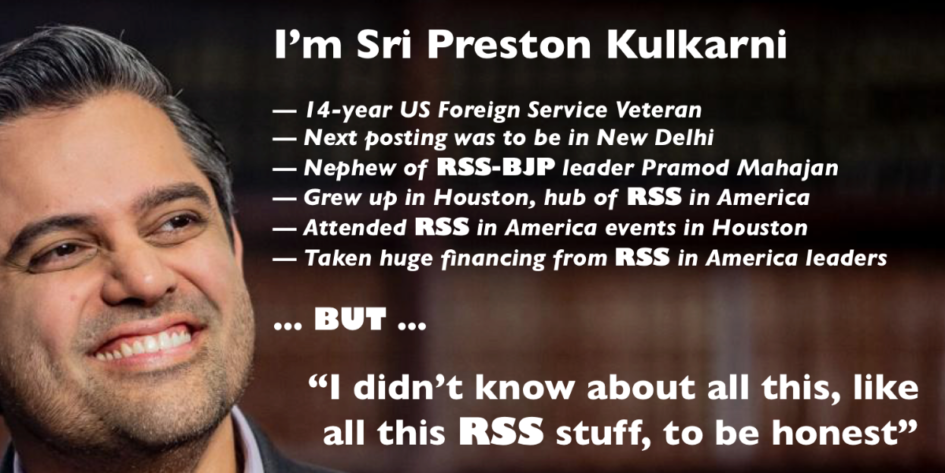
Beginning in August 2020, the issue of US congressional candidate Sri Preston Kulkarni and his ties to American affiliates of India’s Rashtriya Swyamasevak Sangh (RSS) paramilitary began to become the most covered issue in the campaign to represent Texas’s 22nd congressional district.
“The RSS in America is starting to feel its need for more politicians in their pocket who have influence over America’s foreign policy towards India — like Sri Preston Kulkarni,” I said in a Siasat Daily publication in August. “When Kulkarni’s fellow Indian-Americans are so outspoken in opposition to the agenda of India’s ruling Hindu nationalists and yet he remains silent on the issue of foreign policy while, at the same time, taking in large donations from representatives of the Sangh in America, one wonders what kind of a congressman he might make,” I said in another Siasat publication. In September, Emgage Political Action Committee reported they had “discovered that some of Kulkarni’s largest donors and closest supporters are leaders of organizations promoting Hindutva” which they called a “far-right ideology, whose early founders openly praised Nazism” and defined as “completely antithetical to the inclusive and pluralistic values espoused by Emgage.”
Also in September, The Houston Chronicle reported on Emgage’s decision to withhold an endorsement of Kulkarni based on his RSS affiliations and refusal to denounce the paramilitary. That month, a local newspaper published an op-ed that argued that Kulkarni had “alienated a sizeable section of the Hindu activists by not espousing the so-called Hindu ideology openly or by not endorsing [Indian] Prime Minister Narendra Modi’s actions.”
Subsequently, Des Pardes reported on my “meticulous reconstruction of the flow of campaign donations to US Democratic candidate Sri Preston Kulkarni and his jump into American politics.” In October, as reported by ThePrint, Kulkarni was “subjected to much criticism for his purported links to the Hindu Swayamsevak Sangh (HSS), an international offshoot of the Rashtriya Swayamsevak Sangh (RSS), and particularly the organisation’s vice president, Ramesh Bhutada. However, Kulkarni claimed, “I didn’t even know about all this RSS stuff.”
“Win or lose his second campaign for US Congress in the Greater Houston region of Texas, Kulkarni’s decision to launch his first campaign with the aid of top leadership from the US wing of India’s Rashtriya Swayamsevak Sangh (RSS) will haunt his political career forever,” I told TwoCircles.net in October. “And he will certainly never forget ‘all this RSS stuff.’ Yet now that he knows what the word means — assuming his plea of prior ignorance is credible — the supposedly progressive candidate refuses to offer an opinion about the world’s most powerful paramilitary and its fascist agenda.”
“This is a complicated candidacy,” reported Slate in October. “For months, journalist and South Asia expert Pieter Friedrich has been reporting on the candidate’s public ties to figures associated with Rashtriya Swayamsevak Sangh, the militant Hindu supremacist organization that has been influencing India’s politics for 95 years.” Just a few days later, a columnist for Townhall, a conservative site, asserted:
The leaders of a radical Hindu nationalist faction based in India, Rashtriya Swayamsevak Sangh (RSS), are donating toKulkarni to protect their interests in Indo-American relations and advance their extremist and sectarian agenda in India.
The RSS has orchestrated mob violence against Muslims and Christians across India, advocated for ethno-religious cleansing to promote “Hindu-ness” and purity on the subcontinent, and praised both Hitler and Gandhi’s assassin….
The Houston Democrat’s decision to cozy up to these radicals for campaign cash has not gone unnoticed. The largest and most influential Muslim-American political group in the US, Emgage, publicly criticized Kulkarni in August after emphatically endorsing him in 2018. Emgage asked the would-be congressman to reject the Hindu nationalist organizations and their violence but he refused.
As Slate — generally considered a liberal outlet in contrast to Townhall — reported previously, “When Friedrich noted all this in early August, Kulkarni dismissed the reports, calling them ‘absurd’ and saying he has often spoken out against Islamophobia. At a recent campaign event, audio of which was leaked to Friedrich, Kulkarni claimed he ‘didn’t know about all this RSS stuff.’ This is highly unlikely, considering that he has relatives who have served as ministers of India’s ruling, xenophobic Bharatiya Janata Party—which arose out of RSS—and attended multiple events with several RSS-linked politicos in 2018.”
Texas Republican Party Chairman Allen West, unsurprisingly, seized upon the issue for political mileage. “It appears that the Texas Democrat Party not only embraces the rule of the mob, chaos and violence, here but also in India,” wrote West upon sharing the Townhall article. “Can anyone imagine the outrage if the roles were reversed and it was a Republican congressional candidate supported by a violent, racist, extremist group?”
The issue, however, was next highlighted by the generally progressive outlet, The Intercept, which reported in late October, “At the center of the controversy over Kulkarni’s donors is Ramesh Bhutada, the national vice president of the U.S. wing of the Indian Hindu nationalist paramilitary group Rashtriya Swayamsevak Sangh, or RSS.” And, also in late October, Politico reported:
Kulkarni has been criticized for accepting money from donors affiliated with the Hindu American Foundation, Vishwa Hindu Parishad of America, Hindu Swayamsevak Sangh, HAPAC and Modi’s grand diaspora celebrations in the United States. “It is preposterous for your campaign to continue to maintain an anti-fascist posture in theory when your primary financial backers are Islamophobes rooted in the ideology of fascism,” the Indian American Muslim Council recently wrote to Kulkarni. Emgage PAC, a prominent Muslim PAC that endorsed Kulkarni in a 2018 race, is nowwitholding its endorsement in the district because, the group says, “neither candidate is sufficiently aligned with the interests and values of the Texas Muslim community.”
The scandal of Sri Preston Kulkarni’s association with the RSS of America promises to expand and I will continue covering it.

Leave a Reply